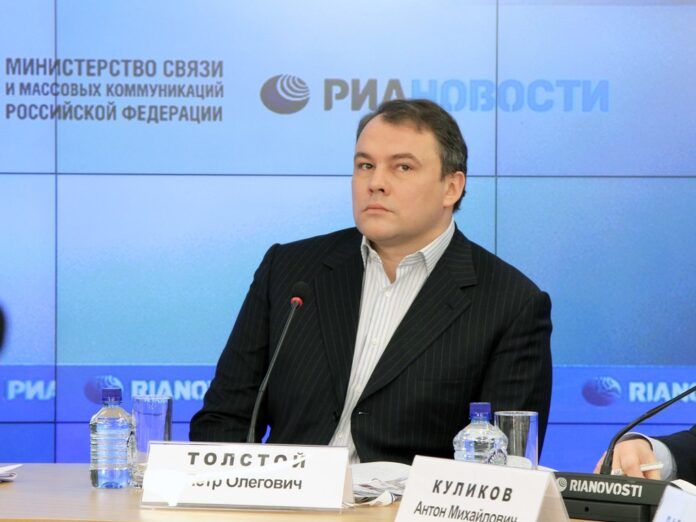Amidst heightened tensions, Russia issues a stark nuclear threat towards Paris, raising concerns over potential escalation and the involvement of NATO forces in Ukraine
In a recent and troubling development, an ally of Russian President Vladimir Putin has issued a stark warning that has sent shockwaves through the international community, suggesting that the Kremlin is contemplating a nuclear strike on Paris. This alarming statement comes against the backdrop of France’s President Emmanuel Macron refusing to dismiss the possibility of NATO’s involvement in Ukraine, a move that has significantly irked Russian politicians and propagandists. The deputy chairman of the Russian Parliament, Pyotr Tolstoy, delivered this shocking message during an interview with French news broadcaster BFMTV, stating, “We are calculating.” Russia’s nuclear threat to France has escalated tensions between the two countries but also between Russia and NATO allies, sparking fears of a potential nuclear confrontation
The threat was articulated as Macron continued to express France’s unwavering support for Ukraine amidst the ongoing conflict with Russia. Macron’s refusal to rule out “operations on the ground” in Ukraine and his stance on preparing for “all scenarios” have heightened concerns over a direct military confrontation between NATO forces and Russia. This situation has been further exacerbated by Putin’s remarks last week, affirming Russia’s readiness for a nuclear confrontation if the country’s red lines, as outlined in its nuclear doctrine, are crossed. These developments raise critical questions about the implications of NATO’s potential involvement in Ukraine, the risk of nuclear escalation, and the overall security of the European continent.
Embed from Getty ImagesThe Mirror
The Mirror coverage highlights a tense and precarious situation unfolding between Russia and France, with serious implications for global security. Deputy Chairman of the Russian Parliament, Pyotr Tolstoy, in a stark warning, stated that Russia is considering a nuclear strike on Paris. This announcement was a direct response to French President Emmanuel Macron’s stance on not excluding the possibility of NATO’s military involvement in Ukraine. Tolstoy’s remarks have underscored the rapidly escalating tensions between NATO countries and Russia, particularly in light of Macron’s refusal to rule out ground operations in Ukraine. This situation is further complicated by Russia’s nuclear doctrine, which suggests that threats to its sovereignty could provoke a nuclear response. The article effectively conveys the gravity of the current geopolitical climate, with NATO’s potential involvement in Ukraine serving as a flashpoint for escalating tensions and the looming threat of a nuclear confrontation.
Newsweek
Newsweek coverage delves into the comments made by Pyotr Tolstoy, the deputy chairman of the lower house of Russia’s parliament, who warned that all French soldiers deployed to Ukraine would be killed. Tolstoy’s remarks came in the wake of President Macron’s reinforced commitment to supporting Kyiv, even hinting at the potential deployment of ground troops. Macron’s statements have not only reaffirmed France’s support for Ukraine but have also highlighted the broader stakes for European security. Tolstoy reiterated Russia’s nuclear threats, emphasizing the country’s readiness for nuclear war and its focus on national security. This report paints a stark picture of the current state of affairs, where verbal escalations and military posturing have heightened the risks of a direct conflict between NATO forces and Russia, raising the spectre of a nuclear confrontation.
The Express
The Express coverage provides a detailed account of the heightened tensions between Russia and NATO, with a specific focus on France’s potential involvement in the Ukraine conflict, after Russia’s nuclear threat to France. The article outlines Pyotr Tolstoy’s chilling warning about the possibility of a nuclear strike on Paris, a direct response to Macron’s refusal to dismiss the option of sending NATO troops to Ukraine. This coverage sheds light on the intricate dynamics at play, including the strategic calculations behind Russia’s nuclear threats and the broader implications for European security. The piece highlights the critical role of diplomatic engagement and the urgent need for a de-escalation of tensions, underscoring the potential consequences of a nuclear confrontation on global stability.
The Sun
The Sun coverage emphasizes the dire warning issued by Pyotr Tolstoy, deputy speaker of the Russian parliament, concerning the potential for a nuclear strike on Paris. Tolstoy’s comments were in reaction to French President Emmanuel Macron’s considerations of deploying troops to Ukraine, a move that has significantly strained Franco-Russian relations. The article captures the gravity of the situation, illustrating the real and present danger of escalation into a full-blown conflict. It further examines the broader geopolitical context, including the implications for NATO and the delicate balance of power in Europe. This report underscores the critical importance of diplomatic efforts to avert a crisis and the need for all parties to engage in constructive dialogue to ensure regional and global security.
The Daily Express
The Daily Express further explores the tensions between Russia and France after Russia’s nuclear threat to France, highlighting Pyotr Tolstoy’s threatening remarks regarding a potential nuclear strike on Paris and the vow to kill any French soldiers sent to Ukraine. This coverage brings to the forefront the escalating rhetoric and the serious implications of NATO’s possible involvement in the conflict. It underscores the delicate balance between demonstrating support for Ukraine and avoiding actions that could lead to a direct confrontation with Russia. The article serves as a reminder of the high stakes involved in the current geopolitical climate, emphasizing the urgent need for diplomatic solutions to prevent further escalation and ensure the safety and security of all involved.
